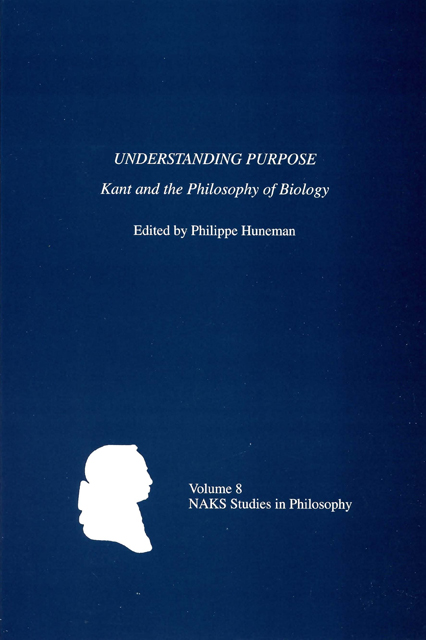Book contents
- Frontmatter
- Contents
- Acknowledgments
- Editor's Notes
- Introduction: Kant and Biology? A Quick Survey
- 1 Pre-Kantian Revival of Epigenesis: Caspar Friedrich Wolff's De formatione intestinorum (1768–69)
- 2 Kant's Persistent Ambivalence toward Epigenesis, 1764–90
- 3 Reflexive Judgment and Wolffian Embryology: Kant's Shift between the First and the Third Critiques
- 4 Kant's Explanatory Natural History: Generation and Classification of Organisms in Kant's Natural Philosophy
- 5 Succession of Functions and Classifications in Post-Kantian Naturphilosophie around 1800
- 6 Goethe's Use of Kant in the Erotics of Nature
- 7 Kant and British Bioscience
- Bibliography
- Contributors
- Index
1 - Pre-Kantian Revival of Epigenesis: Caspar Friedrich Wolff's De formatione intestinorum (1768–69)
Published online by Cambridge University Press: 10 March 2023
- Frontmatter
- Contents
- Acknowledgments
- Editor's Notes
- Introduction: Kant and Biology? A Quick Survey
- 1 Pre-Kantian Revival of Epigenesis: Caspar Friedrich Wolff's De formatione intestinorum (1768–69)
- 2 Kant's Persistent Ambivalence toward Epigenesis, 1764–90
- 3 Reflexive Judgment and Wolffian Embryology: Kant's Shift between the First and the Third Critiques
- 4 Kant's Explanatory Natural History: Generation and Classification of Organisms in Kant's Natural Philosophy
- 5 Succession of Functions and Classifications in Post-Kantian Naturphilosophie around 1800
- 6 Goethe's Use of Kant in the Erotics of Nature
- 7 Kant and British Bioscience
- Bibliography
- Contributors
- Index
Summary
Abstract
In 1768, the German embryologist Caspar Friedrich Wolff (1733–94), recognizing the uselessness of further theoretical argument with Bonnet and Haller on invisibility, felt at an impasse in advancing his views about vis essentialis and formative causes, though he would return to these later in his discussions with Blumenbach. For the moment, it was necessary to produce a work whose professionalism would equal that of Haller on the heart: hence he produced De formatione intestinorum. After summarizing ideas about generation developed in his medical thesis of 1759 (Theoria generationis), Wolff minutely analyzed the development of the internal organs, mainly the digestive system. Recounting the genesis of this work, my chapter suggests that—because it described intermediate embryonic forms, and because it broke with the dominant preformationism as well as with the ancient epigenesis inherited from Aristotle—it appears to be the fi rst great text of modern embryology. Setting the vis essentialis debate apart from the epigenetic problem in embryology, this text made realization of the Kantian teleomechanistic research program an actual possibility.
Introduction
According to the German embryologist Caspar Friedrich Wolff (1733–94), the body cannot be conceived without the existence of a epigenetic force. Wolff thus introduces a deep transformation of biology, releasing it from a conception of organization strictly modeled after the physical world. Even though this liberation is still only partial, and even though it is to Blumenbach and not to Wolff that Kant refers for that reason in the third Critique, Wolff's embryological works do represent a condition of realizability of the Kantian project for the biology.
However, this required fi rst a scientifi c demonstration of the reality of the epigenesis. This actual demonstration came in the De formatione intestinorum, published in the Reports of the Academy of Sciences of Saint Petersburg.Once he had reminded readers of the ideas about generation that he had already explained in his doctoral thesis in medicine in 1759, Wolff went on to study the development of the internal organs, mainly those of the digestive system, in minute detail.
- Type
- Chapter
- Information
- Understanding PurposeKant and the Philosophy of Biology, pp. 37 - 50Publisher: Boydell & BrewerPrint publication year: 2007
- 5
- Cited by



